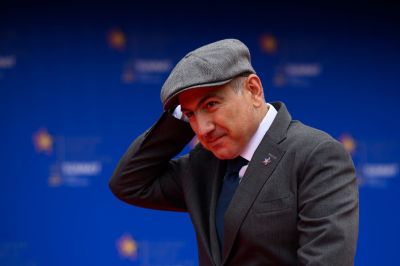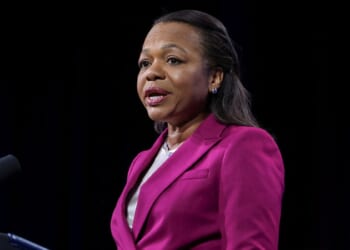
For Armenia, the first nation to adopt Christianity as its religion in 301 A.D., the stakes cannot be any higher. The country is facing total annihilation at the hands of its belligerent neighbors, Azerbaijan and Turkey, which are interested in recreating the Ottoman Empire. Its own leadership is acquiescing to them.
The current prime minister, Nikol Pashinyan, is jailing and punishing his political detractors, including the leadership of its oldest institution, the Armenian Apostolic Church.
On October 3, Archbishop Mikael Ajapahyan, the Primate of the Shirak Diocese, was sentenced to two years in prison for speaking out on the prime minister’s policies. Dozens of other church leaders have been arrested and await sentencing.
There are at least two reasons why the Trump administration should distance itself from Pashinyan.
First, Pashinyan’s domestic policy track record has been disastrous, and those regarding Artsakh is viewed as defeatist by most people in Armenia and the diaspora of Armenian Americans. Armenian Americans voted overwhelmingly for the Trump-Vance ticket in November 2024. If the Armenian voters perceive the administration’s support of Pashinyan as one leading to sacrificing Armenia’s interests to those of oil-rich Azerbaijan and strategically important Turkey, they may lose hope.
Second, hanging the success of the August 8 Agreements on an unpopular and conniving leader, such as Pashinyan, is too risky for President Trump. Having conceded as part of the Agreement to Azerbaijan several key issues that are important to people of Armenia (e.g., the right of return of refugees to Nagorno-Karabakh, the POWs, constitutional amendments, among others), Pashinyan has angered an overwhelming majority of his electorate and is likely to be booted out if elections in Armenia were held free and fair. This makes him unpredictable and a candidate for all sorts of unsavory geopolitical arrangements, to which he is no stranger.
Since Armenia’s independence from the Soviet Union in 1991, its leaders have consistently deceived Western politicians — lying about their ties to Russia, the extent of corruption, human rights abuses, and election integrity.
Prime Minister Pashinyan is no exception.
His public rhetoric reveals a stark contrast to the Western-friendly image he projects abroad and the almost subservient posturing he maintains with leaders of Russia and Armenia’s archrivals, Azerbaijan and Turkey. Now he is cozying up to the United States in the same fashion.
His latest all-out war against the Church shows the full length he is willing to go to please Ankara and Baku. The revealing part of the story is that he started this campaign against the Armenian church after a statement made by Azerbaijan’s top Shia Muslim cleric, suggesting that priests pose “great threat to all neighboring region countries.”
Despite the strong public outcry against his repugnant behavior, Pashinyan did not hesitate to oppress those who voiced dissent. His first victim was billionaire philanthropist Samvel Karapetyan, who was apprehended on June 18 and jailed on charges of trying to overturn the government for making a public statement in support of the Armenian Church. Within days, the Pashinyan-controlled parliament moved to start the process of nationalizing Armenia’s electricity distribution network owned by Karapetyan.
The repressions against the church and opposition leaders have not stopped here, going after high-level clergy, including Archbishop Bagrat Galstanyan. While Ajapahyan was quickly handed a 2-year sentence by Pashinyan’s kangaroo court on October 15, Armenia’s National Security Service (NSS) — the successor of KGB — arrested Bishop Mkrtich Proshyan and several other clergymen from the Aragatsotn diocese following accusations made on TV by a disgruntled former priest.
Despite his “pro-Western” rhetoric, Pashinyan remains a puppet of Russia. His recent rant delivered in the parliament, mocking the U.S. for being a fickle ally on which “the Armenian people should not rely,” is testament to that.
Pashinyan’s abandonment of fellow Christian Armenians in Nagorno-Karabakh in 2020–23 is the main reason the Church leaders have spoken out against him and why he has a single-digit approval rating. Very few in Armenia today would challenge a view that in exchange for being voted into the prime minister’s office by Armenia’s pro-Russian parliament, Pashinyan allowed Azerbaijan to take control over much of Nagorno-Karabakh (consistent with the so-called “Lavrov Plan” spearheaded by Russia’s Foreign Minister Sergey Lavrov). This was the Kremlin’s Plan B, after the main plan associated with Armenia’s previous leader, Serge Sargsyan, failed to trigger an armed rebellion in downtown Yerevan, Armenia’s capital in 2016.
Nowhere is his geopolitical flip-flopping so obvious as in the several dozen visits he has paid to Moscow since taking power in 2018, against only a handful of visits to Washington and European capitals. His visit to, and signing a strategic partnership agreement with Beijing on August 31, only days after the August 8 signing of the Agreements in the White House, is another sign of that.
A dignified and lasting peace between Armenia and Azerbaijan would require leadership in Armenia that has the strong support of the citizenry, that can help rebuild Armenia’s strategic buffers and sovereignty, and that reinforces its Christian heritage. Pashinyan lacks all of this. Attempts by the Trump Administration to trust him and work with him — directly or indirectly — are risky and may backfire.
Dr. David A. Grigorian is a Research Fellow at Harvard University’s Kennedy School of Government and a Non-Resident Fellow at the Center for Global Development in Washington, DC.















